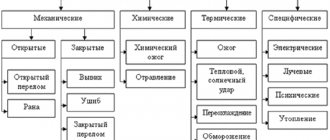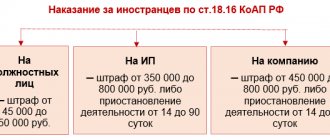Absolutely everyone is familiar with the name of the color “black” - this can be said with confidence. But there is such a seemingly incompatible combination of words as “black wages.” Nevertheless, it is firmly rooted in the usage of words by our people and is heard by almost everyone.
There is also another salary and people dubbed it “white” - it means clean, honest.
“Black” wages have a place in our difficult times. It is very rare when employers conscientiously and honestly want to show their reliable income by paying taxes established by the state on them.
Let's look at the intricacies of the salary, which is called “black”; the “salary in an envelope” has a similar meaning.
What is white, gray and black flashing
In order to save budget, entrepreneurs hire workers without formal employment. The contract between the employer and the worker is concluded orally. A person receives a cash payment personally from the company’s accountant or employer. The citizen continues to be considered unemployed and his work experience is not accrued.
This form of remuneration is called black wages. No transfers to social and pension organizations are made.
The salary is paid to the employee without deduction:
- personal income tax;
- alimony;
- debts from court decisions;
- taxes to the Pension Fund;
- funds for social and health insurance.
Employment without official registration is considered a violation. The employer and the employee who agreed to the scam will be held accountable for receiving illegal wages.
When an employment contract is concluded with a citizen, monthly cash payments can be divided into two parts.
One amount is calculated officially, the second salary in envelopes is given out illegally. Payments not carried out according to accounting reports can be several times larger than the salary from which taxes are withheld.
The mixed form of remuneration is popularly called “gray salary”. The employee's work experience continues, but alimony, transfers to the insurance and pension fund, and personal income tax are not collected in full. Black wages bring more negative consequences than gray wages.
ATTENTION! If an official employment contract was concluded between the employer and the applicant for the position during employment, then the employee will receive a white salary. The monthly salary amount is stated in the document.
Menial wages are paid when the new employee and the employer have verbally agreed on the employee's duties and salary.
Advantages and disadvantages of “gray” wages for the employee and the employer
Let's figure out what the benefits and negative sides are for each of the parties to the transaction for receiving/paying “gray” wages:
| Advantages and disadvantages | For the employer | For employee |
| Advantages | Significantly lower costs for paying mandatory contributions for employees. Obtaining the opportunity not to pay benefits, sick leave, and vacation pay, as required by the Labor Code of the Russian Federation. Reducing the amount of personal income tax paid on employee income. | A smaller part of the income goes towards paying personal income tax (personal income tax), that is, more money is paid out into hand. From a small official salary, a smaller amount of alimony and penalties under writs of execution are withheld. |
| Flaws | Possibility of being subject to sanctions and criminal liability. | Sick leave and vacation payments are calculated based on the official “white” (small) salary and become completely insignificant. The bank will not issue a loan because the income indicated in the documents is too low. There are no guarantees that social benefits will be paid. For concealing income, the employee will be held criminally liable. If the company liquidates or goes bankrupt, the severance pay will be too small. The future pension will be quite insignificant, the insurance period may not be taken into account at all. |
Consequences
Owners of small private enterprises often persuade applicants for a vacant position to work in the organization without registration. The employer explains to the new employee that there is no need to pay taxes and alimony on an unofficial salary, and accordingly, the amount received in person will be greater.
Having agreed to the arguments of the enterprising employer, the new employee accepts the proposed conditions. At first, this form of remuneration seems more profitable, since a person receives the entire agreed amount without tax, insurance, or alimony deductions.
The unpleasant consequences of working without official registration begin later. A citizen who receives a salary in an envelope does not receive sick leave, pay, or vacation pay. The employer may stop paying wages or unilaterally reduce their amount.
It is difficult to reclaim unaccrued money. The main proof of the rights of a working person is an employment contract. If the document was not signed, it means that the parties, by mutual consent, entered into an agreement contrary to the current law.
Adverse consequences of receiving illegal wages for an employee of an enterprise:
- Lack of social guarantees. Citizens who work unofficially do not receive money for sick leave. Without a certificate of income, a worker cannot apply for child benefits or receive child care payments after childbirth. Private entrepreneurs who do not draw up an agreement with an employee do not consider it necessary to pay vacation pay or compensation.
- The employer is able to stop paying wages to employees, citing lack of funds.
- The employer can reduce the agreed amount unilaterally, dismiss a sick employee without warning or severance pay.
- An entrepreneur is free to lay off an employee. In this case, the state employment center will register the citizen, but the minimum benefit will be paid to him.
- A citizen does not accumulate pension points.
- A person receiving unofficial income is considered a tax evader. If a violation is discovered, the citizen will be held accountable.
- The employee's rights are not protected.
- There are no entries in the work book about positions held. It is difficult to prove professional experience in subsequent employment.
- Persons who evade alimony by receiving an unofficial salary face criminal liability.
With unofficial employment, the unpleasant consequences are much greater than the benefits.
ATTENTION! Work performed under a verbal agreement with the employer may remain unpaid. It is difficult to prove the fact of non-payment of labor in this case.
Results
Thus, the most vulnerable party in shadow remuneration schemes is the employee, since if he does not have an employment contract and pay slips, the court often sides with the employer, even if there is other reliable evidence.
Well, for employers, avoiding payment of salary taxes and refusal to formalize an employment contract with an employee, at best, can entail financial expenses in the form of fines and additional payment of taxes and fees, and at worst, criminal liability. You can find more complete information on the topic in ConsultantPlus. Free trial access to the system for 2 days.
Responsibility of the hired employee
A company employee who receives a salary unofficially will be held accountable, as will his employer. The logic is simple: if a person knows that taxes are not deducted from his income and continues to work under these conditions, then the situation suits him.
An employee will avoid punishment:
- to whom the salary is paid in cash, but the person believes that deductions were made from the income received;
- who independently declared his income to the tax office, paid personal income tax, alimony and other tax fees.
The tax return must be filed no later than April 30. In the document, the citizen indicates the income received and its source. Paid insurance premiums and taxes give the right to receive pension points.
For failure to submit reports to regulatory authorities, a citizen faces a fine. The defaulter will be charged the amount of tax and 5% of hidden income.
For particularly large amounts of unpaid tax to the state treasury, citizens can be held accountable under Article 198 of the Criminal Code of the Russian Federation.
Such actions of an individual as concealment of income, non-payment of taxes are considered illegal. For non-payment of taxes to the state treasury in the amount of 600,000 rubles or more, the tax inspectorate and the court have the right to:
- collect from a citizen 100,000 - 300,000 rubles;
- force the taxpayer to perform corrective labor for a period of up to 12 calendar months;
- limit the freedom of an individual to 1 year.
Application to the state labor inspectorate about black wages
You can prepare an application in one of the following ways:
- Arrive at the nearest territorial inspection office with supporting documents and write a statement.
- Prepare an application at home and send it to the inspectorate by mail (preferably by registered mail).
- Use the Internet, fill out an application on the official website of the inspection, or simply send pre-prepared documents via the Internet.
The application is drawn up in any form. But it is important to remember that the inspection does not accept or consider anonymous applications.
In addition, if the complaint against the employer concerns violations that are not within the authority of the inspectorate, then within a week your application will be forwarded to the authority authorized to resolve the problem (for example, the tax inspectorate). The applicant is notified of this in writing.
Complaint to the State Labor Inspectorate about black wages
Employer's liability
Employers who pay salaries in an envelope can be fined large sums by regulatory organizations. An employer who hires an employee without official registration violates the Labor Code of the Russian Federation. For such acts, the head of the organization will be punished under articles of the Code of Administrative Offenses and the Criminal Code.
Controlling authorities conclude that there are illegal payments after:
- analysis of the level of expenses of the organization’s employees and salaries paid at this enterprise;
- receipt of an application to one of the state regulatory organizations (tax, labor inspectorate, prosecutor's office) from employees dissatisfied with the current situation;
- the appearance of information about hidden income on the Internet, newspapers;
- financial audits of the enterprise;
- reconciling the number of people present at workplaces with the number of persons indicated in the accounting statements.
To hold an employer accountable, you need to prove the fact of payment of “black wages.” Control authorities carry out inspections:
- after receiving an application from workers;
- according to the instructions of higher organizations.
Identification of violations of workers' rights leads to the bringing of a legal entity to administrative liability, and the manager to criminal punishment.
LLC, individual entrepreneur and other types of legal entities are subject to a fine for black patching. According to Art. 122, 123 of the Tax Code, an amount of 20% of the amount of tax not transferred to the treasury will be collected from the enterprise. An organization for failure to pay insurance premiums for its employees will be fined from 5,000 to 10,000 rubles.
For failure to pay personal income tax for citizens working at the enterprise in an amount exceeding 2 million rubles, the employer will be punished under Article 199 of the Criminal Code of the Russian Federation. The head of the company will go to prison, and government authorities will collect a large sum of money from the organization.
Judicial practice shows that in our country, punishment in the form of restriction of freedom is rarely applied for such acts. What threatens the employer for black wages, non-payment of taxes, concealment of income:
- in every second lawsuit, the defendant is awarded a large fine;
- suspended sentences in 45% of trials;
- sent to prison in 5% of cases.
Where to complain
An employee who finds out that the employer does not pay taxes and insurance premiums for him has the right to file a complaint with the regulatory authority:
- the prosecutor's office;
- tax office;
- state labor inspection;
- police.
For the victim, it makes no difference which authority begins to verify the legality of the actions of the legal entity. The complaint is supported by documents, witness statements, and recordings of telephone conversations.
IMPORTANT! An employee who receives a mediocre salary indulges the employer. By keeping silent about the facts of violations, an employee of the organization becomes an accomplice in the scam.
Question answer
Question: For several months now, I and several colleagues have not been paid the “black” part of their salaries. Is there a way to achieve this and hold management accountable?
Answer: First of all, you can contact the employer with a requirement to indicate the real amount of remuneration in the employment contract. Next, you can file a complaint, preferably a collective one, with the labor inspectorate and prosecutor’s office, or go to court. But to collect the debt, you need to have strong evidence that the employer must pay wages in exactly that amount.
Question: I was fired from my job back in January, but still haven’t been paid the unpaid part of my salary. The former director initially promised payment within a month, and the accountant even sent a settlement by mail with the amount of debt. Later, during a personal conversation, it was said that the money would not be paid, since it was compensation for some losses of the company due to my work. Where can I complain?
Answer: You can file a complaint with the Labor Inspectorate or the Prosecutor's Office. You can refer to a printout of the sent calculation, but it must indicate the sender’s e-mail and confirmation that it belongs to the employer. You can first send a complaint to the director, where you can communicate your requirements and intention to contact the supervisory authorities.
Question: In our company, salaries are paid in two parts - white and black, but even the first is sometimes delayed, not to mention unofficial payments. How to influence an employer?
Answer: The employer violates both labor and tax laws. In the first case, we are talking about violating the established deadlines for paying wages, in the second – about tax evasion. Accordingly, you can contact the State Tax Inspectorate or the tax office.
How to prove the fact of payment
As evidence, the regulatory authorities and the court are provided with:
- company announcement about the availability of a vacancy with a specified salary.
- accounting reports;
- salary certificates;
- correspondence in phone applications;
- audio and video materials;
- witness statements of employees, persons present during employment.
Receiving a “black” salary is the same offense as paying it. The employee and the head of the organization are brought to administrative and criminal liability.
Violators are punished in accordance with the provisions of the Criminal Code, the Administrative Code and the Labor Code of the Russian Federation. For large non-payments of taxes, the head of a company can be dismissed from his position, convicted, followed by imprisonment.
ATTENTION! Black wages are not beneficial to ordinary workers. A person working unofficially is deprived of his rights. It is difficult to receive the agreed amount from an employer without an employment contract.
When does the tax office become interested?
State supervisory authorities have launched a broad campaign to combat wage shadowing. The company will attract their interest if:
- the declared salary of employees of a particular qualification is stated to be significantly lower than the average level for a given region or for a similar industry;
- According to documents, employees in management positions receive less money than ordinary employees;
- according to data from certificates for 2-NDFL, an employee who changed his place of work began to receive a salary lower than the old one (logic dictates that a person will not change his place to a less profitable one);
- an employee of an organization, in order to obtain a loan, indicated in bank documents a different salary level than what is listed in the tax reports for his organization;
- a signal was received about the payment of a gray or black salary (an employee’s complaint, appeal, or even an anonymous call or letter).
What written evidence can confirm the fact of issuing “gray” wages ?







